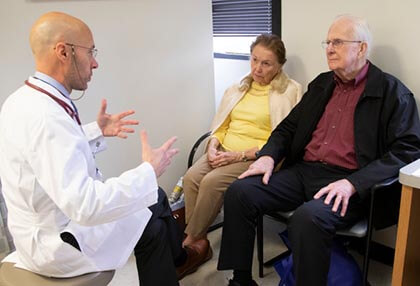

Kidney Cancer Advocate and Caregiver
Nearly 74,000 new cases of kidney cancer were diagnosed in the U.S. last year, joining the more than half a million people currently living with the disease. Many patients eventually require support from a family caregiver. In fact, caregivers form the foundation of the patient care team. They step into the role as soon as their loved one is diagnosed and can quickly find themselves juggling numerous new responsibilities, from information specialist to medical translator, financial advisor, nurse, and therapist. The transition can be challenging. Focused on their loved one getting better, it’s easy to overlook the stress, fear, and concern that weighs on a caregiver’s shoulders. Their voices need moments in the spotlight, too.
So, we reached out to a couple of our Patient Council members who are also experienced caregivers, and they shared some helpful advice – along with words of encouragement – for fellow kidney cancer caregivers. Learn more about the Kidney Cancer Program at UT Southwestern Medical Center, including our patient advocacy, support services, and community outreach efforts.
Question: What is your first piece of advice or recommendation for a caregiver of someone newly diagnosed with kidney cancer?
Sophia: “Allow yourself time to fully process – emotionally and psychologically – the news you’ve been given. It can help put you in a better position to support your spouse (or loved one) through this transition as you both move forward to the next chapter in your lives… living with cancer. Most importantly, try and stay positive. While you will have a new normal, together – with love and patience – you will get through whatever lies ahead. Also, know that this has the potential to bring an enriching dimension to your relationship. Positive things can result from challenging circumstances.”

Kidney Cancer Advocate and Caregiver
Jurgen: “You are a vital resource of hope to the patient, so try and always remind them of the positives. Show empathy and love, but never pity. You want to help build up their fighting spirit and reinforce their courage. Show them you are there for them and make sure they see that your efforts are out of love and not personal sacrifice.”
Question: What are some practical tips that you found helpful as a caregiver that you wish someone had shared with you early on?
Sophia: “Familiarize yourself with your spouse’s duties. That way, if the day comes when you need to take over their responsibilities, the learning curve is less frustrating. I had to become knowledgeable about many things that my husband took care of, such as finances, home and car repairs. I created an “all you need to know” binder, for which my husband provided guidance. We initially did this together, and now I modify it as needed. Also, document what happens between doctor visits, so you can refer to it at the patient appointments. And create a list of questions for the doctor, as well – remembering no question is silly. Doctor visits can go by quickly, so it helps being organized and having your notes and any questions prepared in advance and ready to go.”
Jurgen: “Manage expectations when it comes to the treatment process and recognize that the situation can change. The nature of kidney cancer means that recurrence is always a possibility. While today’s therapies are better at holding the disease in check or even putting it in remission, you should always remember that cancer can return and it can spread. This means that courses of treatment can fluctuate. It came as a surprise to us when seven years after my wife’s operation spots on her lungs began showing up. They have been managed with radiation ever since. It helps to be flexible when changes arise. And remember to stay positive and celebrate the victories.”
Question: What are recommendations would you give to other caregivers regarding caring for their own health – mental and/or physical?
Sophia: “Make time for yourself away from being a caregiver – take walks, stay in touch with friends, find someone with whom you’re comfortable leaning on for support and accept help if and when it’s offered. Most importantly, don’t be hard on yourself. It’s okay to be tired, scared and even cry. I did my fair share of crying. We all need a release.”
Jurgen: “Try and find someone who can fill the role of a support person for you, be it a family member or good friend. Someone you can use as a sounding board, to whom you can unload any worries frustrations, doubts, or pent up fears you may experience from time to time – feelings with which you don’t want to burden your loved one, the patient.”
Question: For caregivers of spouses, what is a helpful tip for adjusting to the new normal in their relationship with their partner?
Sophia: “Keep the channels of communication open and continue to show your love for each other. Do the things that make you happy and stronger as a couple. Don’t let cancer change that. Believe it or not, treasured memories can come from this experience!”
Jurgen: “Adjust your needs to those of your loved one. Let them set the pace and tone of your relationship according to his or her abilities.”







